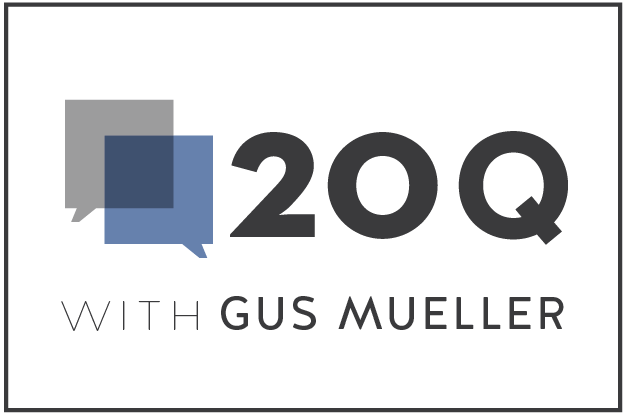 From the Desk of Gus Mueller
From the Desk of Gus Mueller

While there has been research evidence for decades suggesting a significant association between hearing loss and cognitive decline, in the past ten years or so, this relationship has been one of, if not the most talked about topic in audiology. And not just at conferences and in professional journals, but as one might guess, it’s very newsworthy for the lay press and local TV station. We’ve all seen the articles regarding the reported correlation between hearing loss and dementia.
Correlation of course, does not prove causation, and therefore, questions we must ask include: Is hearing loss in older adults predictive of cognitive decline? Is hearing loss a modifiable risk factor for dementia? Does the use of hearing aids delay the onset of dementia? And related to this, do audiologists then conduct testing for cognitive decline? As is obvious from clinical practice, advertising trends, and social media discussions, the views on these topics vary considerably among audiologists.
In an attempt to “clear the air” a bit, we’ve brought in two noted researchers in this area—one from the UK, and a second from Australia. If the names Munro & Dawes, or Dawes & Munro seem familiar to you, it well could be because they jointly have been authors on over 75 journal articles—not quite Jagger-Richards or Lennon-McCartney territory, but getting close.
Kevin Munro, PhD, is the Ewing Professor of Audiology, at the University of Manchester and the honorary Consultant Clinical Scientist at Manchester NHS Foundation Trust. He is the national director of the NIHR Research for Patient Benefit program. He previously served as Director of the Manchester Centre for Audiology and Deafness (ManCAD), Deputy Director of the NIHR Manchester Biomedical Research Centre, and theme lead for Hearing Health.
Piers Dawes, PhD, is a Professor of Audiology and Director of the Centre for Hearing Research (CHEAR) at the University of Queensland, and an adjunct Professor of Audiology at the University of Manchester. Dr. Dawes was US-UK Fulbright scholar and received the British Society of Audiology’ TS Littler prize for services to audiology for his work on the epidemiology of hearing impairment.
A great article on cognition and hearing loss was published by Kathy Pichora-Fuller in the Canadian Audiologist last year. Her opening line was a quote taken from the 6th century BCE Chinese social philosopher Confucious:
“What you know, you know; what you don’t know, you don’t know. This is true wisdom.”
I’m not sure if our guest authors Kevin and Piers follow the teachings of Confucious, but I do know that in this 20Q article they did an excellent job of reviewing what we really do know about the complex often-intertwined topics of hearing loss, cognition and hearing aid use. And perhaps even more importantly, they clearly spelled out what we don’t know. This is true wisdom!
Gus Mueller, PhD
Contributing Editor
Browse the complete collection of 20Q with Gus Mueller CEU articles at www.audiologyonline.com/20Q
20Q: Hearing Loss, Hearing Aids and Dementia - Don’t Let the Science be Hijacked by Hype
| Since the posting of this 20Q, there has been a document published on this topic, jointly by the British Society of Audiology, British Academy of Audiology and The British Society of Hearing Aid Audiologists: Position Statement and Practice Guidance. You can read the document here. |
Learning Outcomes
After reading this article, professionals will be able to:
- Describe the association between hearing loss and cognitive decline.
- Summarize the current evidence on causality.
- Explain the association between hearing loss and cognitive decline in terms appropriate for patients, audiology colleagues, and policymakers.

1. Let me first say that I am just getting started in audiology. The partner of a good friend of mine has a hearing loss, and they are both devastated to be told by their audiologist that it is a harbinger of dementia. They have asked me for advice. To be honest, I feel somewhat out of my depth. Do either of you have any tips?
Dawes: I am glad you have raised this topic, because there also is an increasing number of people here in Australia who are being told something similar, either from professionals or the media. You could start by asking if they were told that hearing loss causes dementia or that they simply co-occur.
2. Well, I believe that they were told hearing loss probably contributes to dementia, and that hearing aids will likely slow cognitive decline. I thought this might be a misunderstanding, or an isolated incident, but now I am alarmed to hear similar reports from Australia. What about the UK, Kevin?

Munro: There is a lot of hype about hearing loss and dementia in the UK. I am not surprised that the evidence is sometimes misunderstood or misquoted. It’s such a newsworthy story. My concern is there is a danger that people, including some audiologists, are being hypnotized by the hype.
3. Wow, if it is such a widespread problem, I am glad I raised this topic with both of you. My friends are pretty smart and would like me to summarize the evidence. Where should I start?
Munro: You could explain it is correct that there is an association between sensory function and cognition. We have known for more than 100 years that people with greater hearing or vision loss tend to have poorer cognitive ability (Galton, 1883). Since that time, researchers studying aging have commented on this association between sensory function and cognition; poorer hearing or vision acuity is associated with poorer cognitive ability (Baltes & Lindenberger, 1997; Lindenberger & Baltes, 1994). There is also evidence from more recent studies showing an association between hearing loss and risk of developing dementia later in life (Lin et al., 2011).
4. I have heard both of you mention previously that association doesn’t mean causation, but what exactly does this mean?
Dawes: In a nutshell, an association means there is a statistical relationship (called a correlation) between hearing loss and cognitive decline. People with more severe hearing loss are at greater risk of cognitive decline. But an association doesn’t mean hearing loss causes cognitive decline (or vice versa), or that treating hearing loss will necessarily slow down cognitive decline. Here’s an example from everyday life: as the sale of ice cream increases in Brisbane, the number of people having an outdoor BBQ also increases, but why? The most likely explanation is there is a third factor that is common to both of these e.g., the increase in air temperature with the arrival of summer. The summer weather is responsible for the increase in ice cream sales and also the increase in BBQs.
5. OK, so hearing loss doesn’t necessarily cause cognitive decline? But haven’t I heard both of you say that hearing loss could cause cognitive decline?
Munro: Yes, this is plausible. Hearing loss results in reduced audibility and the impoverished auditory input might conceivably change how the brain functions. Same might apply due to the increased listening effort (i.e., greater demand on our cognitive resources) caused by hearing loss. Also, if hearing loss results in isolation and social withdrawal it might indirectly impact on brain function. So, it is definitely plausible. On the other hand, the relationship might be like Piers’s summer weather explanation above, meaning there is another factor that results in both hearing loss and cognitive decline. This could be something such as hypertension or obesity or cigarette smoking (D’Amico, Amestoy, & Fiocco, 2020; Matthews et al., 2022).
Dawes: It’s definitely an appealing prospect if hearing loss actually impacts on cognition, because avoiding or treating hearing loss might reduce the risk of dementia (Lin & Albert, 2014). It sounds like this is what your friend was told. A review on dementia intervention, prevention and care (Livingston et al., 2020) concluded that eliminating or entirely mitigating hearing loss could potentially reduce the overall number of cases of dementia. Of course, this isn’t the case if there is a common cause.
6. Yes, I’ve heard that. I think I read that avoiding hearing loss or wearing hearing aids reduces our potential risk of dementia by 8%, right?
Dawes: Sorry, that’s incorrect and a frequent misunderstanding. Hearing loss is very common so treating it may reduce the overall number of cases of dementia by 8%. This is why the Lancet review said hearing loss is the single largest potentially preventable factor. But your personal risk is not 8%, and the potential risk of dementia from hearing loss is no higher than other factors such as depression. Also, in countries where dementia cases are predicted to increase the highest, there may well be factors other than hearing loss that could have a greater impact on the overall number of cases of dementia.
Munro: Just to underline this point made by Piers, 8% is not the strength of risk of dementia to an individual. It’s the potential reduction in the number of cases of dementia in the population if all the effects of hearing loss could be mitigated. That’s currently a tall order since the majority of people with hearing loss don’t own hearing aids (Sawyer, Armitage, Munro, Singh, & Dawes, 2020) and a sizable proportion have them, but don’t wear them (Dillon, Day, Bant, & Munro, 2020). Even if hearing loss is ultimately shown to impact on cognitive health, it might not be the factor that yields the highest reduction in overall cases across the world. Other factors such as reducing cigarette smoking might have a bigger effect in reducing the overall number of cases of dementia (Dawes, 2019).
7. I need to get this straight. Are you saying we do not know if the associations do represent a causal impact of hearing loss on cognitive health? How come?
Dawes: Well, almost all studies (including the three relevant ones in The Lancet review) look at a cross-section of the population and have observed that individuals with hearing loss who use hearing aids are likely to have less cognitive decline than those who don’t use hearing aids. But none of these studies have randomized people to be hearing aid users or not. This means the observed difference between the users and non-users might be because there are underlying differences between people who choose to use hearing aids from those that don’t.
8. Like what, for example?
Dawes: Well, in one of our studies, we have shown that people who use hearing aids are better educated and more affluent that people with hearing loss who don’t use hearing aids (Sawyer et al., 2020). Maybe these differences influence their lifestyle and reduce their personal risk of cognitive decline. In any case, we recently reviewed observational studies, and the evidence is mixed (Dawes & Völter, 2023). Three cochlear implant studies showed positive outcomes in relation to long-term cognitive improvements, which is encouraging, but the quality of the evidence was low. We identified eight hearing aid studies showing a positive impact and eight that did not. Does that sound convincing to you?
9. Not really, but I did see an impressively large UK study recently that got a lot of publicity, and reported the risk of dementia was lower in people with self-reported hearing difficulties who use hearing aids compared to those who don’t use hearing aids. Your thoughts on this?
Munro: I think you might be referring to the study that analyzed a very large UK data set (Jiang et al., 2023). I need to mention that this was an observational study, meaning that the researchers examined a cross-section of the population, some of whom had hearing aids, and some did not. It received a lot of publicity and attention because of the newsworthiness of the findings. It was accompanied by several editorials and extensive media coverage extolling the results. What you might not have seen is the rather quiet retraction of the original paper (and the editorials). This was because there was an error in the original coding of the data and the two groups were reversed (Retraction Watch, 2024). In fact, the risk of dementia was higher for hearing aid users than non-hearing aid users.
10. No way?! But that’s not possible, is it?
Munro: Well, first of all, recall that this was an observational study so there may be confounding factors that could explain the findings. In the UK Biobank (the source of the data in the Jiang et al study), hearing aid use has been shown to be a reliable marker of greater hearing difficulty and higher hearing aid use (Wells et al., 2019). Also, we mentioned earlier that risk of dementia is higher in people with greater hearing difficulty. So, it might be less newsworthy, but a possible explanation is that greater hearing difficulty might explain both the higher use of hearing aids and the higher risk of dementia.
11. But that’s the complete opposite finding! Isn’t it scary that the findings were published in a prestigious journal with a huge fanfare of publicity. Have the corrected results and the alternative explanation been reported?
Munro: Not yet, as far as we know. But we agree that it does seem appropriate to see a revised version of the manuscript published with equal prominence to that of the original publication, in which the corrected results are reported, and the alternative interpretation discussed.
Dawes: Just to put this into context. It is well established that the scientific literature is biased towards “favorable” research findings (Ferguson & Heene, 2012). Ideally, the literature should be a balanced and transparent record of all research outcomes, with articles valued according to the importance of the research question and the quality of the science, rather than the newsworthiness of the findings.
12. Thank you for clarifying for me; otherwise, I might have missed the retraction and continue to report the original findings. So how will we be able to say for sure if treating hearing loss reduces the risk of cognitive decline and dementia?
Dawes: Randomized Controlled Trials, often simply referred to as RCTs, have fewer biases than observational studies because participants are randomly allocated to receive hearing aids or not. However, trials of this sort are challenging for lots of reasons: they require large number of participants to be monitored over a long time period. There are also ethical issues of randomizing participants to a control condition when they have a hearing loss because we already know there are proven benefits of hearing aids (Ferguson et al., 2017).
13. These sound like major challenges. Have any RCTs been published investigating the effectiveness of hearing aids at reducing cognitive decline in adults with hearing loss?
Dawes: Yes, last year saw the publication of the ACHIEVE trial that investigated if hearing aids reduce cognitive decline (Lin et al., 2023; ACHIEVE is the acronym for the Aging and Cognitive Health Evaluation in Elders). This is an impressive RCT in terms of scale, rigor, and potential impact. The main finding was clear: when measured after three years, there was no difference in the rate of cognitive decline between the hearing aid group and the controls.
14. No differences at all?
Munro: Well, there is much ongoing work, and the authors did report on a secondary analysis where there was less cognitive decline in a subgroup of hearing aid users. However, the effect was small (in statistical terms, around 0.25 sd), and it is not clear if the error rate (when conducting multiple statistical tests) was controlled across all the tests presented.
Dawes: The authors of ACHIEVE argue that the benefits of hearing aids may only be apparent in a ‘high risk’ population with multiple co-morbidities. But that hypothesis is contrary to all of the epidemiological evidence, which shows associations between hearing loss and cognitive outcomes and potential benefits of hearing aids in the general population – not only in high risk sub-samples (Loughrey, Kelly, Kelley, Brennan, & Lawlor, 2018). Also, the cognitive benefits of hearing intervention in the ACHIEVE high risk subgroup were not associated with increasing severity of hearing loss. Strange that the severity of hearing loss should have no bearing on the benefits of the hearing intervention. These are all reasons why we shouldn’t jump to conclusions.
15. So, based on what we know today, what do each of you think we can conclude from the literature?
Munro: I would say it is inappropriate to address hearing loss in terms of dementia prevention on the grounds of both relevance to the individual and lack of clear evidence of benefit.
Dawes: I agree. I share the concern raised by Blustein et al. (2023), which I expressed in the Dawes and Volter article mentioned earlier, that the focus on dementia and negative messaging might increase stigma that prevents people from seeking help for hearing loss.
I would add that although there’s no strong case for promoting hearing aids to prevent dementia, it is important that audiologists address the hearing needs of people living with dementia. We know that hearing loss often goes unaddressed among this population. That is a problem, because hearing loss exacerbates the impact of dementia. Audiologists should certainly provide dementia-friendly hearing services (Dawes, 2018).
16. Okay… makes sense. I’ve heard some people suggest that audiologists should routinely be testing people’s cognition. Is that a good idea?
Dawes:It is important to know whether your patient has dementia, so that you can provide appropriate support. You can find out if someone has dementia via referral notes or taking a case history. It’s true that some people may not have a formal diagnosis of dementia though. In specific cases, it may be appropriate to do a dementia screening test that is appropriate for someone with hearing loss. Two examples are the hearing impaired MoCA (Dawes, Reeves, et al., 2023) or the proxy report version of the GPCog (Brodaty et al., 2002). These findings might help work out if dementia could be contributing to someone’s communication difficulties. But I would not recommend routinely doing cognitive assessments. If you do carry out a cognitive screening, it would be important to ensure you have proper training in doing the assessment and communicating the results to patients, and that you can refer people to a local memory clinic.
17. I see. But why shouldn’t audiologists routinely check for dementia among all their patients?
Munro: Well, the main reason is that national dementia guidelines recommend against routinely screening for dementia among older adults, because of a lack of evidence for benefits of early detection of dementia and the potential to cause distress because of false positive identification of dementia (Dawes, Robinson, & Leroi, 2023). So, just to underline what Piers has just said, it is only appropriate to check for dementia when you have a good reason for doing so.
18. Right. Returning to my original question about hearing aids to prevent dementia, what should I tell my friends?
Munro: Rather than promoting hearing aids as a way of preventing dementia, I would remind them of the proven benefits of hearing aids in facilitating an active, independent, engaged, and healthier older age.
19. Okay, I get it. Stick to the importance of addressing hearing loss per se. What should I tell my audiology colleagues?
Munro: We suggest you and your colleagues continue to raise awareness about the prevalence of hearing loss and its impact on quality of life along with the proven benefits of hearing interventions. Avoid negative messaging about associations between hearing loss and dementia risk.
20. Well, my last question is about policymakers who are now showing an interest in hearing loss because of the hype about the association with cognition and dementia. What’s your message for them?
Dawes: Capitalize on their interest by emphasizing the benefits of hearing interventions in facilitating healthy aging, maintaining independent functioning, and reducing health care costs. The danger of concentrating on the association with dementia is if the evidence does not support this link, they may lose interest in hearing loss completely.
Munro: I agree completely. If you want to follow up on any of our comments, you’ll find a useful summary in Dawes and Munro (2024).
References
Baltes, P. B., & Lindenberger, U. (1997). Emergence of a powerful connection between sensory and cognitive functions across the adult life span: a new window to the study of cognitive aging? Psychology and Aging, 12, 12-21.
Blustein, J., Weinstein, B. E., & Chodosh, J. (2023). It is time to change our message about hearing loss and dementia. Journal of the American Geriatrics Society, 1-4. https://doi.org/10.1111/jgs.18323
Brodaty, H., Pond, D., Kemp, N. M., Luscombe, G., Harding, L., Berman, K., & Huppert, F. A. (2002). The GPCOG: a new screening test for dementia designed for general practice. Journal of the American Geriatrics Society, 50(3), 530-534.
D’Amico, D., Amestoy, M. E., & Fiocco, A. J. (2020). The association between allostatic load and cognitive function: A systematic and meta-analytic review. Psychoneuroendocrinology, 121, 104849.
Dawes, P. (2018). Addressing the hearing needs of people with dementia. Psychogeriatrics, 31(2), 203-221.
Dawes, P. (2019). Hearing interventions to prevent dementia. Hno, 67(3), 165.
Dawes, P. & Munro, K.J. (2024). Hearing loss and dementia: where to from here? Ear and Hearing, Published ahead of print. DOI: 10.1097/AUD.0000000000001494
Dawes, P., Reeves, D., Yeung, W. K., Holland, F., Charalambous, A. P., Côté, M., ... Martins, R. N. (2023). Development and validation of the Montreal cognitive assessment for people with hearing impairment (MoCA‐H). Journal of the American Geriatrics Society.
Dawes, P., Robinson, G., & Leroi, I. (2023). Screening for Dementia in Audiology Clinics–Advantages, Pitfalls, and Recommendations. The Hearing Journal, 76(06), 26-27.
Dawes, P., & Völter, C. (2023). Do hearing loss interventions prevent dementia? Zeitschrift für Gerontologie und Geriatrie, 1-7.
Dillon, H., Day, J., Bant, S., & Munro, K. J. (2020). Adoption, use and non-use of hearing aids: a robust estimate based on Welsh national survey statistics. International journal of audiology, 59(8), 567-573.
Ferguson, C. J., & Heene, M. (2012). A vast graveyard of undead theories: Publication bias and psychological science’s aversion to the null. Perspectives on Psychological Science, 7(6), 555-561.
Ferguson, M. A., Kitterick, P. T., Chong, L. Y., Edmondson-Jones, M., Barker, F., & Hoare, D. J. (2017). Hearing aids for mild to moderate hearing loss in adults. In Hearing aids for mild to moderate hearing loss in adults (Vol. 9).
Galton, F. (1883). Inquiries into Human Faculty and Its Development. London: Macmillan.
Jiang, F., Mishra, S. R., Shrestha, N., Ozaki, A., Virani, S. S., Bright, T., . . . Zhu, D. (2023). Association between hearing aid use and all-cause and cause-specific dementia: an analysis of the UK Biobank cohort. The Lancet Public Health, 8(5), e329-e338.
Lin, F. R., & Albert, M. (2014). Hearing loss and dementia–who is listening? In Vol. 18 (pp. 671-673). Taylor & Francis.
Lin, F. R., Metter, E. J., O'Brien, R. J., Resnick, S. M., Zonderman, A. B., & Ferrucci, L. (2011). Hearing loss and incident dementia. Archives of neurology, 68(2), 214.
Lin, F. R., Pike, J. R., Albert, M. S., Arnold, M., Burgard, S., Chisolm, T., . . . Glynn, N. W. (2023). Hearing intervention versus health education control to reduce cognitive decline in older adults with hearing loss in the USA (ACHIEVE): a multicentre, randomised controlled trial. The Lancet, 402(10404), 786-797.
Lindenberger, U., & Baltes, P. B. (1994). Sensory functioning and intelligence in old age: a strong connection. Psychology and aging, 9(3), 339.
Livingston, G., Huntley, J., Sommerlad, A., Ames, D., Ballard, C., Banerjee, S., . . . Cooper, C. (2020). Dementia prevention, intervention, and care: 2020 report of the Lancet Commission. The Lancet, 396(10248), 413-446.
Loughrey, D. G., Kelly, M. E., Kelley, G. A., Brennan, S., & Lawlor, B. A. (2018). Association of age-related hearing loss with cognitive function, cognitive impairment, and dementia: a systematic review and meta-analysis. JAMA otolaryngology–head & neck surgery, 144(2), 115-126.
Matthews, K., Dawes, P., Elliot, R., Maharani, A., Pendleton, N., & Tampubolon, G. (2022). Allostatic load and risk of hearing impairment. Brain, Behavior, and Immunity, 25.
Retraction Watch. (2024). ‘We should have followed up’: Lancet journal retracts article on hearing aids and dementia after prodding. Retrieved from https://retractionwatch.com/2024/01/04/we-should-have-followed-up-lancet-journal-retracts-article-on-hearing-aids-and-dementia-after-prodding/
Sawyer, C., Armitage, C. J., Munro, K., Singh, G., & Dawes, P. (2020). Biopsychosocial Classification of Hearing Health Seeking in Adults Aged Over 50 Years in England. Ear and Hearing.
Wells, H. R., Freidin, M. B., Abidin, F. N. Z., Payton, A., Dawes, P., Munro, K. J., . . . Williams, F. M. (2019). GWAS identifies 44 independent associated genomic loci for self-reported adult hearing difficulty in UK Biobank. The American Journal of Human Genetics, 105(4), 788-802.
Citation
Munro, K.J. & Dawes, P. (2024). 20Q: Hearing loss, hearing aids and dementia - don’t let the science be hijacked by hype. AudiologyOnline, Article 28918. Available at www.audiologyonline.com



